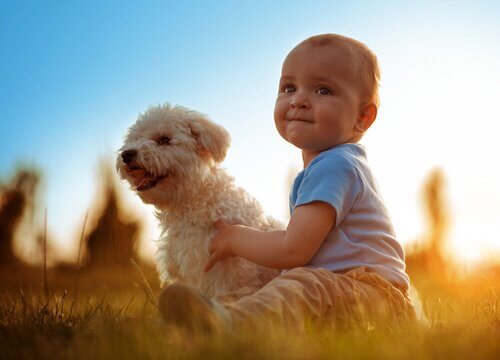We expect the arrival of a baby, but also with many fears and doubts, a common concern is the coexistence between animals and babies, we think of all the dangers that can arise from this coexistence, without paying attention to the benefits it can bring. Bring.
However, the success of this relationship will depend, in large part, on not forgetting our pet, if we continue to take care of their physical and emotional needs, there will be no reason not to form one of the first and most beautiful friendships a baby can have.
- When animals and babies grow together.
- The benefits are endless.
- Parents who have the opportunity to enjoy this relationship will be pleasantly surprised every day.
- Here are some of the benefits that animals bring to baby development.
Babies are very interested in exploring and studying the world, and animals are a pleasant source of stimuli, with them the knowledge they derive from their former?Experiences? With the world getting richer. Playing with a friend offers more varied, exciting and fun experiences.
In this way, agility is driven by the baby’s attempts to visually follow the animal and then move towards it. In addition, will you discover new textures in the body of the animal ?, textures that you will love to caress.
Animals are extremely sensitive to babies because they know they are a fragile and helpless being who needs delicacy and protection, on several occasions we hear from animals that rescue babies, protect them from fatal accidents or care for them in extreme situations. This is not fiction: the instinct of animals leads them to preserve the lives of puppies.
Babies learn to receive care and care for their animals. They learn to interact with these family members with whom they share time and space. Animals and babies learn to take care of each other; love and show affection very spontaneously.
In addition, different studies show that children who grow up with dogs and cats are emotionally smarter and more compassionate. A study of children from three to six years old showed that children who have pets are more empathetic to animals and other humans.
When parents engage children and babies in animal care, they feel more capable and competent, thus strengthening their self-esteem. Caring for a pet (both in the family and in the classroom) gives children an important new sense of responsibility. as well as significantly increase your self-esteem.
According to Nienke Endenburg and Ben Barda, “if there are pets in a house and parents and children care for them regularly, children learn early to care for and feed an animal that depends on them. “That’s why, currently, in many countries, early childhood classes have a pet in the classroom. The responsibility to care for an animal creates a sense of safety and acceptance of children in children.
Animals help babies develop a stronger immune system, which will better prepare them for different diseases.
Researchers from the University of Finland conducted an interesting study for the journal Pediatrics, which found that babies under one year old living with dogs or cats are 30% less likely to suffer from coughing, rhinitis or fever. In addition, the same study shows that the likelihood of these babies contracting ear infections is reduced by half.
The fact that parents and caregivers talk to the baby will have a very positive impact, both on cognitive development and on language acquisition, it is important that we take the time to talk to the baby, to convey affection through caresses and words. However, we often ignore communication between animals and babies.
When animals and babies grow together, communication between them is constant and extremely rewarding, the baby will try to communicate and find in their partner a receiver always willing to listen and respond, so far studies on this topic tell us that having a pet facilitates language development and improves the future communication skills of the baby.
Children extract a lot of information from reality by playing and interacting with animals, something that, in turn, stimulates the cognitive development of young people, as well as increasing the IQ they will have in the future.
Animals represent a way of living the physical and social world, responding to their first verbalizations, bodily expressions, movements and contacts.
According to Amparo Fortea, “several studies show that children who interact with healthy animals have fewer adaptation problems, are more responsible and have a stronger immune system. “Some people say that babies and children who grow up with pets are happier.
In any case, the fact that they have developed and strengthened the aforementioned skills makes it easier for babies who have grown up with animals to socialize and develop stronger and deeper bonds.
Over time, babies notice that things are constantly changing, while others remain. People, the family, are the strongest support points in children’s lives. And it’s within this family that they include animals. They are a source of safety and complicity for children.
Animals, in turn, feel responsible for the care and protection of babies, which can sometimes be stressful for them at first, so it will be up to us to make them live this change in the best way possible, however, once adapted to change. , they will discover another person to love. Another person who loves you; someone to play with and share with.
It is not enough to want your baby to grow up with a pet, it is essential to take responsibility, understand your rights, your needs and ensure your well-being, an animal needs time, dedication and care, in this sense we must be sensible and consistent, because they deserve the best.
Animals teach us responsibilities, emotions and consequences; animals teach us what family is, what love is; animals are understood because babies communicate through innocence, unconditionality and tenderness; the privilege of growing up with one or more animals, regardless of our age. It is certainly priceless, animals make us better people.

